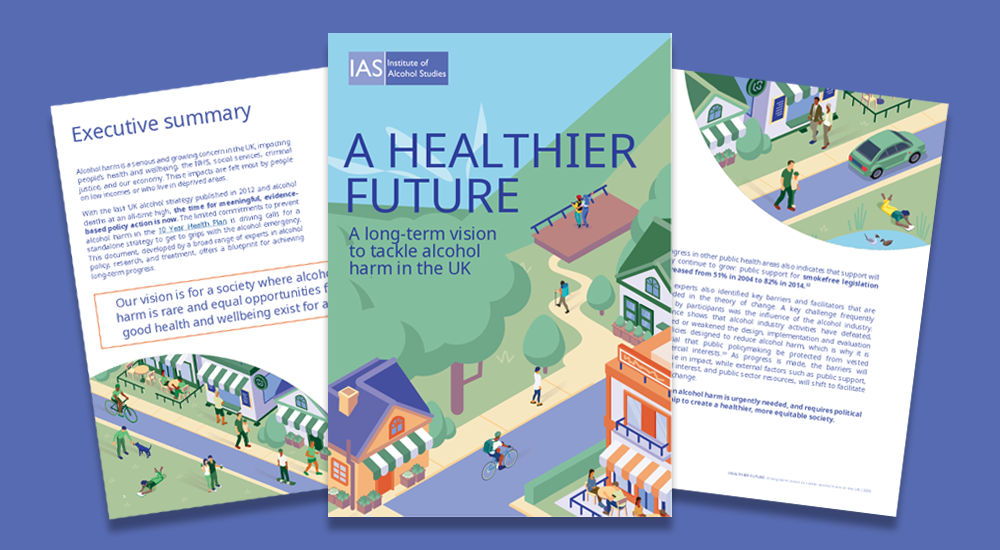Professor John Holmes contributes to major new report outlining actions to tackle alcohol harm

SARG Director Professor John Holmes was part of an expert panel that supported the development of 'A Healthier Future: A long-term vision to tackle alcohol harm in the UK', a significant new report published by the Institute of Alcohol Studies (IAS) this week.
The IAS, an independent UK charity that works to advance evidence-based public policy on alcohol, convened a diverse group of specialists – including academics, treatment providers, policymakers, and civil society organisations – to create a shared vision, three clear targets, and eight evidence-based policy priorities. This blueprint is designed to drive a cohesive, long-term national strategy to reduce alcohol-related harm over the next decade.
Key targets for the next decade
The report identifies three primary goals for the UK government to work towards over the next ten years:
- Halve the prevalence of risky drinking from 1 in 3 UK adults to 1 in 6.
- Increase the proportion of people with alcohol dependence accessing specialist alcohol treatment to 50% within 5 years, and build capacity in the system for 80% of people with alcohol dependence to have access to treatment within 10 years.
- Reverse the trend of alcohol-specific deaths, returning to the pre-pandemic rate within 5 years, and subsequently to 2012 levels within 10 years.
Priority policy recommendations
To achieve these targets, the IAS, with input from the expert panel, devised eight evidence-based policy recommendations, focusing on cost-effective public health interventions:
- Introduce minimum unit pricing at 65p per unit in England and increase regularly in line with inflation.
- Reinstate the alcohol duty escalator at a minimum of 2% above inflation.
- Introduce restrictions on alcohol marketing, as a minimum equal to those applied for unhealthy food and drink.
- Empower local authorities to regulate hours of sale and online deliveries of alcohol.
- Provide increased and sustained investment in alcohol harm prevention and treatment services.
- Introduce mandatory alcohol product labels that include clear health warnings, ingredients and nutritional information, and the UK low risk drinking guidelines.
- Lower the drink-driving limit across all UK nations.
- Introduce guidelines to manage government interactions with the alcohol industry.
The report, along with a visual roadmap and accompanying technical report, is available on the IAS website. Read the full report here: A healthier future: A long-term vision to tackle alcohol harm in the UK.
-
SARG researchers to showcase local health modelling at the Prevention Research Conference 2026
Researchers from the Sheffield Addictions Research Group (SARG) will present work from the Local Health and Global Profits programme at the Prevention Research Conference 2026 in Birmingham on 4-5 March.
-
New research shows that spending less on tobacco, gambling and sweets is good for the UK economy
A new study from the Sheffield Addictions Research Group (SARG) has found that public health policies which reduce spending on harmful products can actually provide a significant boost to UK jobs and the wider economy.
-
SARG researcher Dr Parvati Perman-Howe secures NIHR Career Development Award
We are delighted to announce that Dr Parvati Perman-Howe, a Research Associate within the Sheffield Addictions Research Group (SARG), has secured a highly sought-after Career Development Award.
-
SARG researchers present on economic modelling and wastewater surveillance at European Public Health Conference
Two researchers from the Sheffield Addictions Research Group (SARG), Dr Charlotte Head and Dr Esther Chanakira, will showcase innovative local-level tools for policy design, including economic modelling and wastewater surveillance, at the European Public Health (EPH) Conference in Helsinki from 11–14 November 2025.
You might also be interested in…
-
Natural experimental evaluation of increasing the minimum unit price for alcohol in Scotland to 65p
This natural experimental evaluation will investigate the public health impact of the increase in Scotland's minimum unit price (MUP) for alcohol from 50p to 65p in September 2024
-
SARG researcher Dr Parvati Perman-Howe secures NIHR Career Development Award
We are delighted to announce that Dr Parvati Perman-Howe, a Research Associate within the Sheffield Addictions Research Group (SARG), has secured a highly sought-after Career Development Award.
-
New SARG report details alcohol-related health and financial burden in Northern Ireland
The Sheffield Addictions Research Group (SARG) has published new analysis estimating the substantial health and financial toll of alcohol consumption in Northern Ireland, using the most recent available post-pandemic data.
